 Mushi No Ne (Chirping of Insects) As I wrote before, wagashi is often made to reflect seasonal themes, and named to tell us what it is depicting. This one is no exception. Can you guess what they named this wagashi? --- The answer is mushi no ne 虫の音 (chirping of insects). The two brown lines represent autumn grass, perhaps leaves of sedge or susuki (Japanese silver grass), and the black sesame seed is a cricket. The chirping of cricket is a typical autumn theme here, perhaps as in other countries, too, and many Japanese associate the sound with the serenity and a slight sadness of a long autumn night. We especially love the chirping of suzumushi (Homoeogryllus japonicus, Japanese bell cricket or bell insect), which sounds like this. (Click on the 56K next to the audio icon under the photo of the insect.) This type of wagashi is called manjuu, which is basically steamed cake usually with sweet bean paste filling. If grated yam is added when making the skin, it is called joyo manjuu, and the skin turns out whiter, softer and moister. I assume that is what this is. Sorry, I forgot to take a shot to show you inside of this manjuu. Instead, I added some trivia about the chirping of insects, so please read on if you are interested. Read More  If you stayed overnight in a small village here in Japan in autumn and got fascinated by the beautiful chorus of the bell insects surrounding you, you might be tempted to let your friend in a bigger city hear it. So you hold the receiver of the house phone or your cell phone out of the window to let it catch the chirping sound. But your friend will not hear it. It is a widely-knonwn(?) fact here that the frequency of bell crickets’ chirping is too high for a phone to capture. According to some Japanese websites, a telephone can transmit the sound with the frequency below 3500Hz. But the frequency of the chirping of bell crickets is apx. 4500Hz, so it cannot be transmitted by phone. If you stayed overnight in a small village here in Japan in autumn and got fascinated by the beautiful chorus of the bell insects surrounding you, you might be tempted to let your friend in a bigger city hear it. So you hold the receiver of the house phone or your cell phone out of the window to let it catch the chirping sound. But your friend will not hear it. It is a widely-knonwn(?) fact here that the frequency of bell crickets’ chirping is too high for a phone to capture. According to some Japanese websites, a telephone can transmit the sound with the frequency below 3500Hz. But the frequency of the chirping of bell crickets is apx. 4500Hz, so it cannot be transmitted by phone.Another well-known theory here is that Japanese people and Western people hear the chirping of insects differently. The theory says that when a Japanese person hears it, (s)he uses the left hemisphere of the brain, while a Westerner hears the same sound using the right hemisphere, where the sound, noise and the music are processed. I think this is based on a book called Nihonjin no No ("The Japanese Brain" 1978) by Tadanobu Tsunoda. He gave dichotic listening test to both Japanese and Westerners and made a comparison. I haven’t read this book myself so I’m not 100% sure, but from what I've read in a couple of websites quoting this book, his findings seem to have indicated that Japanese do hear linguistic sounds using the left hemisphere of the brain and other sounds (music, noise, etc.) using the right hemisphere, just like Westerners do, with some exceptions: Chirping of insects and the sound of certain Japanese musical instruments are processed in the left hemisphere of the Japanese brain (or maybe more precisely, the brain of those who speak Japanese as the first language.) Does this mean that we Japanese are hearing those sounds as "linguistic sounds?" Are we perceiving that the insects or the musical instruments are "talking" to us??? Aren’t we strange people? ;) * Wagashi by Shingetsu Categories: Wagashi |
Saturday, September 30, 2006
Sweet Seasons / September 2006 - Mushi No Ne -
Posted by
obachan
at
9/30/2006 09:39:00 PM
16
comments
![]()
Friday, September 29, 2006
Carrot Dressing
 Green Salad with Carrot Dressing  I started with a Japanese recipe I found on the net, and the ingredients were grated carrots, grated onion, grated garlic, salad oil, vinegar, salt, pepper and sugar. But I found it too sour, so as usual, I added some twists of my own. I added soy sauce, olive oil, sherry, more sugar and even finely chopped pine nuts (leftover from my previous basil pesto attempt). Perhaps I added too many ingredients… I think they pretty much hid the natural sweetness of the carrots. But the dressing tasted good with these cucumbers and lettuce, and even better when used as a sauce for fish meuniere. :) I started with a Japanese recipe I found on the net, and the ingredients were grated carrots, grated onion, grated garlic, salad oil, vinegar, salt, pepper and sugar. But I found it too sour, so as usual, I added some twists of my own. I added soy sauce, olive oil, sherry, more sugar and even finely chopped pine nuts (leftover from my previous basil pesto attempt). Perhaps I added too many ingredients… I think they pretty much hid the natural sweetness of the carrots. But the dressing tasted good with these cucumbers and lettuce, and even better when used as a sauce for fish meuniere. :) Sorry, I forgot to take a shot of the meuniere... BTW, some of you might be interested in this… I passed the test that I took about a month ago. Yay! Categories: Western-inspired |
Posted by
obachan
at
9/29/2006 11:52:00 PM
8
comments
![]()
Labels: Salad/Dressing
Tuesday, September 26, 2006
Bento in the Park
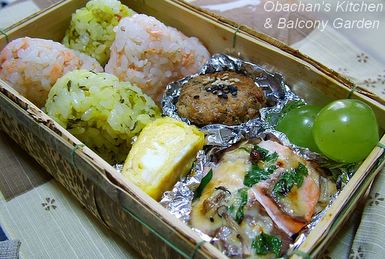 Bento I made last Sunday Do you want to know what the food in the bento box is? OK, starting with the rice balls: * Onigiri with minced takana pickles (green) and with salmon flakes (pink). * Shiso and chicken meatballs * Tamagoyaki (rolled omelet), * Grilled salmon with shimeji mushrooms, mitsuba leaves and miso-mayonnaise glaze, and * Grapes.   So here I posted a photo that I took on my way back from the park. This was the only photo of a sign of autumn. So here I posted a photo that I took on my way back from the park. This was the only photo of a sign of autumn.Oh well, there’ll be more weekends to come, so we’ll see… Categories: Japanese |
Posted by
obachan
at
9/26/2006 11:37:00 PM
11
comments
![]()
Labels: Bento
Saturday, September 23, 2006
Sorry Ancestors! - Apple Crumble -
 Apple Crumble (Obachan's Version) 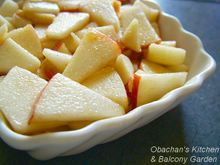 Sorry, ancestors. But the aroma of cooking apples and spices from the oven is just too irresistible on an autumn afternoon like this. And this apple dessert is awfully tasty and easy to make, so nothing could stop me. Sorry, ancestors. But the aroma of cooking apples and spices from the oven is just too irresistible on an autumn afternoon like this. And this apple dessert is awfully tasty and easy to make, so nothing could stop me.I used this recipe, but probably I made a mistake in scaling it down… The crumble did not turn out crumbly at all so I ended up adding more than half a cup of extra flour. I also added a couple of things that were not included in the recipe: a little lemon juice and allspice to the apple filling and finely chopped almond (roasted) to the crumble.  It tasted good even without ice cream 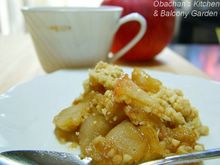 It worked brilliantly. Oh this was such a perfect dessert for this September afternoon. And the good thing is -- I had a lot of crumble left (I really think I made a mistake when scaled down the recipe) and froze it. Next time I can make this apple dessert much more easily ;) It worked brilliantly. Oh this was such a perfect dessert for this September afternoon. And the good thing is -- I had a lot of crumble left (I really think I made a mistake when scaled down the recipe) and froze it. Next time I can make this apple dessert much more easily ;)Or it doesn’t always have to be with apples, right? Categories: Sweets |
Posted by
obachan
at
9/23/2006 06:27:00 PM
10
comments
![]()
Friday, September 22, 2006
Asari Takikomi Gohan
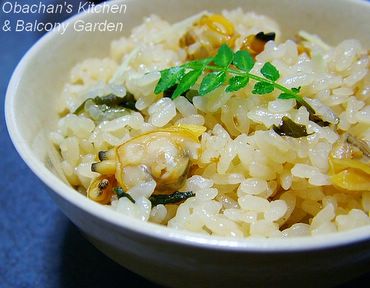 Asari no Takikomi Gohan (Japanese Pilaf with Short-necked Clams) When it starts getting cooler and more and more autumn fruits start occupying the shelves at local grocers and supermarkets, I feel this strong urge to make takikomi gohan (Japanese pilaf) with my donabe (clay pot). Today I went for asari (short-necked clam) takikomi gohan, which was actually part of the course meal at our kaiseki place last month. When it comes to takikomi gohan, there is one rule that I always follow: I never make takikomi gohan without sake and mirin. Well, actually I might go for it if I had either one of them, but if I run out of both, I never make takikomi gohan.  For me these two ingredients make a lot of difference. As I probably wrote somewhere before (did I? I don’t remember exactly…) alcohol and amino acids they contain contribute in adding extra flavors as well as helping the food absorb flavors of the seasonings. For me these two ingredients make a lot of difference. As I probably wrote somewhere before (did I? I don’t remember exactly…) alcohol and amino acids they contain contribute in adding extra flavors as well as helping the food absorb flavors of the seasonings.And what’s more, mirin prevents food from being mushy while being cooked. It is said that it prevents certain binding substance between cells from melting when heated. So, for me, mirin is a crucial ingredient for this kind of dish because I cannot stand mushy rice, especially mushy takikomi gohan. (I heard that professional Japanese chefs often add a little mirin or salad oil when they cook rice for making donburi, because mushy rice is a big no-no for that type of dish.)  For this takikomi gohan, I used asari and wakame kelp. The topping -- sansho (Japanese pepper) leaves and minced ginger -- were supposed to reduce the fishiness and bring out the flavor of asari clams. I made nameko mushroom miso soup to accompany this rice dish. For this takikomi gohan, I used asari and wakame kelp. The topping -- sansho (Japanese pepper) leaves and minced ginger -- were supposed to reduce the fishiness and bring out the flavor of asari clams. I made nameko mushroom miso soup to accompany this rice dish.Oh, there’s one more thing: To make this takikomi gohan, I used the new rice harvested just recently. Actually, here in Kochi, it’s not a big deal to be able to eat new rice in September, because it is usually available in late August. Here people plant rice earlier so that they can harvest it before the typhoon season comes. One thing you have to be careful about cooking new rice is using a little less amount of water. New rice contains more water than older rice, so adjustment is necessary. Well, I’m talking about the sticky short-grain rice we eat here in Japan, but I wonder if it is the same with long-grain rice. Categories: Japanese |
Posted by
obachan
at
9/22/2006 10:22:00 AM
10
comments
![]()
Labels: Claypot dish, Rice dish
Monday, September 18, 2006
Kaiseki Chronicles #5
|
Posted by
obachan
at
9/18/2006 01:48:00 PM
6
comments
![]()
Labels: Kaiseki
Friday, September 15, 2006
Can You Guess What Kind of Chiffon Cake This Is?
 Beer Chiffon Cake Thank you so much for guessing, everyone! :D Yes, some of you guessed right. I used BEER! I copied this beer chiffon cake recipe from the same recipe book when I copied the lime chiffon cake recipe. It inspired me a lot, but I hesitated to try it out because it said “boil 350 mL of beer down to 20 mL.” Gee! How many hours would it take?! So I waited until my busy time of the month was over so that I can spend enough time in the kitchen to make this cake.  To my surprise, it really didn’t take long to boil down the beer. The beer turned into this thick, caramelized liquid (left photo, in the glass) a lot quicker than I had expected. Since the recipe recommended to use flavorful beer, I avoided happoshu (low-malt beer) and chose this all-malt beer instead. The aroma from the boiling beer filled my kitchen, and though I can’t say I loved it, it wasn’t unpleasant at all. To my surprise, it really didn’t take long to boil down the beer. The beer turned into this thick, caramelized liquid (left photo, in the glass) a lot quicker than I had expected. Since the recipe recommended to use flavorful beer, I avoided happoshu (low-malt beer) and chose this all-malt beer instead. The aroma from the boiling beer filled my kitchen, and though I can’t say I loved it, it wasn’t unpleasant at all.Then I found that I did something stupid... as usual. When I copied the recipe from the book, I noticed that the basic procedure was the same as lime chiffon cake, so after copying the part about preparing the beer, I just put, “same procedure as lime chiffon cake” to save my trouble. But I stumbled into this question: “When should I add the beer to the batter?” because the lime chiffon cake recipe, of course, didn’t say anything about that. Finally I decided to add the caramelized beer to the batter at the point when the lime rind and juice were supposed to be added in the lime chiffon cake recipe. I don’t know if that was a right decision or not, but the cake rose alright and didn’t fall miserably, so I guess it was OK.   And I’m proud to show you this photo (above). See how I removed the cake from the pan this time?! The secret is the tool they call “chiffon knife” here. Yes, I finally bought one, and now even an obachan like me can do a good job like this. Yay! And I’m proud to show you this photo (above). See how I removed the cake from the pan this time?! The secret is the tool they call “chiffon knife” here. Yes, I finally bought one, and now even an obachan like me can do a good job like this. Yay!IIRC, the recipe said the beer chiffon cake is very good with loosely whipped cream, so I gave it a try, too. But to be honest, I think it tasted the best when I tried the test batch while it was warm without whipping cream or sugar dusting. (When I bake a chiffon cake, I always scale the recipe in half but still I have some batter left in the bowl after filling my 8 cm chiffon pan. So I bake it in a paper muffin cup as a test batch.)  Categories: Sweets |
Posted by
obachan
at
9/15/2006 04:26:00 PM
21
comments
![]()
Labels: Cakes
Tuesday, September 12, 2006
Home-made Shiso Drink
 Home-made Shiso (Perilla) Drink Last weekend I spent good amount of time with my mom, taking photos of her tea ceremony performance. And when I was about to leave, she gave me this home-made shiso drink in a big PET bottle. So I realized that this was the time to do what I had promised her one year ago. Don’t you ever think that this bright pink color came from artificial coloring. The color was produced by 100% natural ingredient: purple shiso leaves. Some of you may know that purple shiso is used to color umeboshi (Japanese salty plum pickles). This shiso drink has gained popularity in my hometown in the past couple of years. Now you can see green and purple shiso being grown here and there in town. About half of my mom’s veggie garden turned into a “shiso jungle” this year. I’m not exaggerating… Shiso usually grows like crazy, and mom gave it some fertilizer before summer! :O 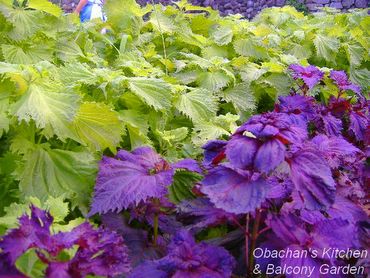 Mom kept making this shiso drink for the whole summer this year. Her way seems to be a little different from a "standard" way. She says that it is important to use both green and purple shiso leaves while most shiso drink recipes on the net call for purple shiso only. According to her, if used green shiso only, the juice will turn brownish and a bit flavorless, and if used purple shiso only, the color will be much deeper reddish pink and the taste will be a bit too strong. I guess mom uses only a small amount of the purple ones – maybe apx. 20% of the green ones. Then WHY did she need to plant two kinds of purple shiso?!   The wrinkled type (right) is said to produce deeper pink color than the flat type (left).  It is not difficult to make this drink, but it is just a lot of work. First, you have to pick crazy amount of shiso leaves and wash them all very carefully. Then you add some water and a little citric acid and soak the leaves in the solution overnight until they turn yucky brownish color. Next morning, drain and squeeze out all the juice from the leaves into the brown-colored solution, add sugar and bring to boil. You’ll end up with bright pink shiso juice. (It looks rather red in this photo, though.) My mom drains the juice again, and keeps it in bunch of PET bottles after cooled. Imagine a fridge full of plastic bottles like these... It is not difficult to make this drink, but it is just a lot of work. First, you have to pick crazy amount of shiso leaves and wash them all very carefully. Then you add some water and a little citric acid and soak the leaves in the solution overnight until they turn yucky brownish color. Next morning, drain and squeeze out all the juice from the leaves into the brown-colored solution, add sugar and bring to boil. You’ll end up with bright pink shiso juice. (It looks rather red in this photo, though.) My mom drains the juice again, and keeps it in bunch of PET bottles after cooled. Imagine a fridge full of plastic bottles like these...* Again, this is mom's way. Looks like many people just boil shiso leaves in a pot instead of soaking them in citric acid solution overnight. Btw, I asked mom not to use an aluminum pot for this.  The drink is quite strong as it is, so we always add some water and ice to thin it down. It makes a refreshing and healthy after-bath drink. Well, now summer is almost over, and so is mom's summer ritual with this fragrant herb and pet bottles. (It's about time she and her friends should take a break from this drink.) Categories: Drinks |
Posted by
obachan
at
9/12/2006 05:42:00 PM
17
comments
![]()
Thursday, September 07, 2006
Chocolate Chip Cookies
 Chocolate Chip Cookies I had this sudden craving for chocolate chip cookies yesterday and baked some. Here’s the recipe. Now I’m a big fan of this allrecipes site because you can scale the recipe up or down and convert it into metric!! I wonder if there is a blogger hack that does this… Categories: Sweets |
Posted by
obachan
at
9/07/2006 10:48:00 AM
6
comments
![]()
Labels: Cookies
Sunday, September 03, 2006
Green Blog Project - Caprese-style Salad -
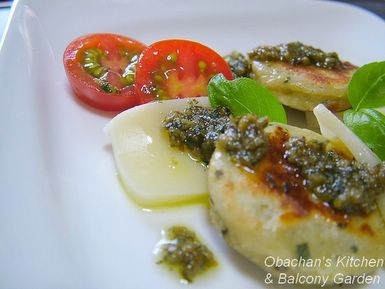 Mozzarella & Tomato Salad with Pan-fried Gnocchi and Basil Pesto Ever since I read the post about Green Blog Project by L.G. of Ginger and Mango, I had been looking forward to posting an entry for it. It's such a lovely project of growing something in your own garden, making a dish using it as a main ingredient, and posting about it on your blog with the recipe. And finally, the day has come. Here is my entry – Mozzarella and Tomato Salad with Pan-fried Gnocchi and Basil Pesto!! And this basil pesto was, of course, made with the basil from my balcony garden. :D This morning I picked almost all the leaves on my little basil plants. Actually my original plan was making basil pesto and slathering it on fish fillet to grill… well, until I stumbled upon this Japanese site last night. Looking at this beautiful color combination of red, white and green, I just HAD TO jump on this idea and try it out myself. To make basil pesto, I chose this Fresh Basil Pesto recipe on Simply Recipes. But my basil harvest was much less than 2 cups, and the amount of pine nuts and grated cheese left in my kitchen was very limited, so I ended up making my pesto with these:  Fresh Basil Pesto (obachan's version) Fresh Basil Pesto (obachan's version)-- Ingredients -- Apx. 1C fresh basil leaves 20 g grated cheese 1/4 C olive oil 15 g pine nuts 2 medium-sized garlic cloves, minced Salt and black pepper to taste Unfortunately my cheap electric blender could not handle such a small amount of ingredients... I had to rely on my good old mortar and pestle again. :O Making pesto with these old-fashioned tools was some work, let me tell you. Now, for the gnocchi, I was going to follow the pan-fried gnocchi recipe on the above-mentioned Japanese site. But since the dough turned out too mushy and sticky (I wonder why), I needed to add much more flour than the original recipe called for. So what I did was more like this: Pan-fried Gnocchi (obachan's version) -- Ingredients -- 2 potatoes (150 g) 4 to 5 Tbsp flour 1/2 egg, beaten 2 tsp basil pesto Salt and black pepper to taste I boiled and mashed potatoes, and added basil pesto, salt, pepper, egg and flour. Then I rolled out the gnocchi dough, cut out small round pieces using a cookie cutter, and pan-fried them with olive oil. After all the gnocchi were done, I placed them on a white plate with mozzarella cheese and cherry tomato slices and topped them with my home-made basil pesto. It was such a shame that I was too hungry to be more artistic. Now looking at these photos, I think I should have shown more olive oil on this white plate. But such a thought didn’t come to my mind then. As soon as I took these two shots of the salad, I just dug in.  Oh, this salad was soooooooo good! Today’s lunch with this Caprese-style salad was definitely one of my best Sunday lunches. What I had read was right.  The combination of tomatoes, mozzarella, basil, olive oil and garlic is simply divine! And the basil-pesto-mixed gnocchi were really delicious! The combination of tomatoes, mozzarella, basil, olive oil and garlic is simply divine! And the basil-pesto-mixed gnocchi were really delicious!So after lunch, I happily started working on this entry for the GBP. Then, when I tried to upload the photos, I realized for the first time that I forgot something important: I forgot to take a photo of my basil before making the pesto!! :O AHHHHH!!! There was nothing else I could do but to take this shot of my naked basil plants. I hope this photo meets the criteria of the GBP. Is this OK, LG? Categories: Western-inspired |
Posted by
obachan
at
9/03/2006 09:11:00 PM
14
comments
![]()
Labels: Salad/Dressing

















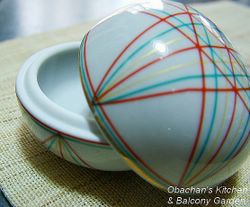 To tell you the truth, we’ve gone through some changes in the past couple of months at the small kaiseki place where I work. In August, one of the chefs quit in the middle of the month. For the rest of the month, we had a chef who came as a temporary help in the kitchen. It was kind of hilarious. He was undoubtedly a good-hearted, fun person, but obviously not a very meticulous type. Me and this helper chef did make “brave” decisions once in a while when the kitchen was terribly busy. (Don’t tell that to our head chef, please.) :P
To tell you the truth, we’ve gone through some changes in the past couple of months at the small kaiseki place where I work. In August, one of the chefs quit in the middle of the month. For the rest of the month, we had a chef who came as a temporary help in the kitchen. It was kind of hilarious. He was undoubtedly a good-hearted, fun person, but obviously not a very meticulous type. Me and this helper chef did make “brave” decisions once in a while when the kitchen was terribly busy. (Don’t tell that to our head chef, please.) :P